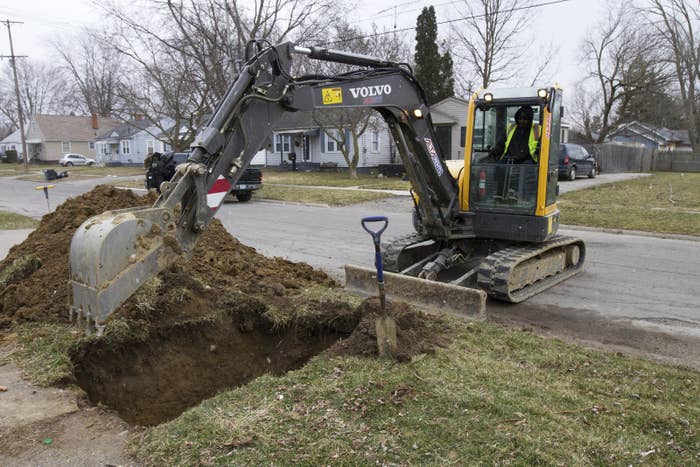
Officials have agreed to excavate water lines to at least 18,000 homes in Flint, Michigan, and replace any that are made of lead or galvanized steel, more than two years after residents began complaining of water quality and health problems.
The settlement in a lawsuit filed by a group of pastors, activists, and a Flint mother was approved by a federal judge on Tuesday. It calls for excavations and replacement work at all estimated 18,000 occupied households connected to the city water system to be completed by 2020.
Flint's water crisis drew international headlines and prompted a state of emergency after high levels of lead were found in the blood of local children. Residents brought murky, brown water in bottles to meetings with officials, and told how the tainted water was causing rashes and making them sick.
Since then, 13 state and local officials have been charged criminally for their role in the water crisis. Class action lawsuits have also been filed against the Environmental Protection Agency and local school districts, accusing them of not doing enough to protect residents, particularly children.

The problems started after the city switched its water source in April 2014 from Detroit's water system to the local Flint River. But the attempt at cost savings left pipes corroded, and lead began leeching into the water supply.
In September 2015, studies confirmed what residents had feared: that the water contained dangerous levels of lead. Later that year, the city switched back to Detroit water, but problems with its infrastructure remained. Residents were encouraged to filter their water, and in 2016, the state began to make free bottled water available.

The city has already started replacing its lead pipes, but the settlement now requires all lead pipes connecting homes and the water system to be replaced.
On Tuesday, the plaintiffs of the lawsuit called it an unprecedented victory that would restore not just safe water, but dignity to local residents.
"They told us our water was safe when they knew it wasn't," said Allen Overton, a representative for Concerned Pastors for Social Action in Flint. "We used our power as citizens to take on a government that failed the people in every way."
Under the settlement, $30 million of federal money approved by Congress will join $67 million in state funding to identify and replace lead lines. Provisions are also included to test tap water quality and make filters available to residents. Until lead levels improve, bottled water will continue to be available.
Melissa Mays, a Flint resident and one of the lawsuit's plaintiffs, said she hopes the settlement serves as an example to other cities facing issues with lead and water quality.
"We hope the utilities and the governments do the right thing, but we also want residents to know you have the power to force change, and enforce it with the power of the court," she said.
